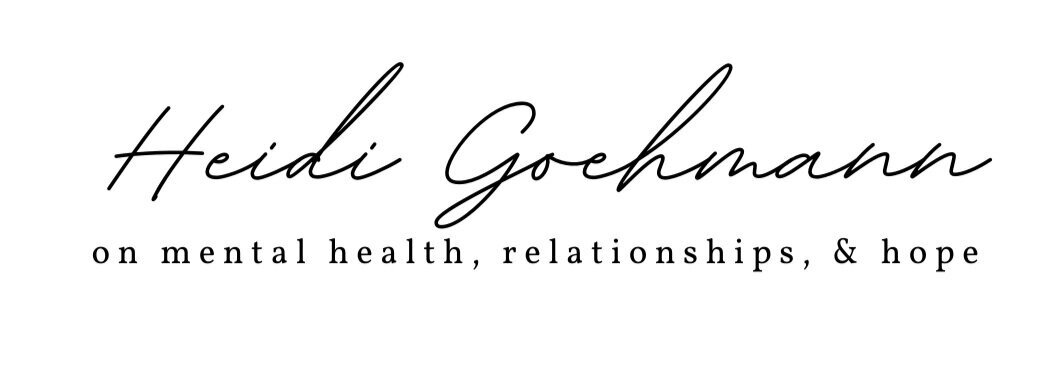The Many Versions of Reconciliation
Sometimes God tells us to do hard things. Sometimes God puts us in hard relationships.
Sometimes God places these two things together and asks us to do what seems nearly impossible:
Love the ones who have hurt us.
Love the ones who were supposed to protect us.
Love the ones who have sinned against us.
Yet, while we talk about loving our neighbor, we also have to talk about boundaries. There are times when loving and reconciliation on this earth do not meet. Not every relationship in our lives was meant to be fully reconciled before Jesus comes again. And then there are times when God opens a door and directs our lives in such a way where a version of reconciliation and forgiveness is possible.
It is a difficult place in which we find ourselves when our family members are the least supportive of those we love, the most destructive of those we know, or the least likely people we are to put on a list of “Top 100 People I’d Like to Hang Out With.” That doesn’t mean we love them any less, but that can make the love more painful to look at, to see, to touch, and to talk about.
A version of reconciliation is what I believe God asked of Jacob and Esau.
A version of reconciliation is what I believe He sometimes asks of us.
Chasms aren’t usually created in a moment. It usually takes one hundred moments, or one thousand, or still more. I could recount for you all that Jacob had done against Esau – stealing, cheating, lying, hurting, condescending – or you can look it up for yourself in the chapters of Genesis. Sometimes when we have been hurt, it’s comforting to read and to know that there have been messed up families from the beginning of time, and we are not the only ones who have walked this weary road. God saw His children then and He sees us now. If you can take the time to read the whole giant saga that is Jacob and Esau’s relationship beginning in Genesis 25 of the Bible and reading through Genesis 33. It’s engaging and reads like a novel.
The subheading in my Bible for Genesis 31 is this: “Jacob Flees from Laban.” Genesis 32 has, “Jacob Fears Esau” and “Jacob Wrestles with God.” And then Genesis 33 has, “Jacob Meets Esau.” I think a more appropriate subheading for this entire section would be:
“Finally … Reconciliation.”
There are nearly as many false starts and familial issues in these last chapters as can be found in the earlier part of the saga, but the difference is that all roads lead to reconciliation. Each reconciliation looks so very different - very few look complete in any way - but they all involve roads God paved for Jacob to find some growth, a little less heartache, and a little more hope.
First, the Reconciliation Road of Strong Boundaries
God uses the relationship Jacob has with his father-in-law to lead him down a literal road back to Esau, and in the middle, they find reconciliation with one another:
“Then Laban said to Jacob, “See this heap and the pillar, which I have set between you and me. 52 This heap is a witness, and the pillar is a witness, that I will not pass over this heap to you, and you will not pass over this heap and this pillar to me, to do harm. 53 The God of Abraham and the God of Nahor, the God of their father, judge between us.” So Jacob swore by the Fear of his father Isaac,54 and Jacob offered a sacrifice in the hill country and called his kinsmen to eat bread. They ate bread and spent the night in the hill country.” Genesis 31:51-54
This reconciliation looks like, “How about you stay on your side and I stay on mine, mmm-kay?”
They even ate bread together over this. Covenanted over this. Sometimes strong boundaries are a very good thing.
Second, the Reconciliation Road of Faith
Jacob needed some reconciling with God. God found him, wrestled him to the ground, and gave him a broken hip and a new name. Sometimes our reconciliations will look a little wounded, but we get a new name for ourselves, for our loved ones, or for our relationship.
Third, the Reconciliation Road of Affection
There are few things more beautiful than what we read of Esau’s gracious response to Jacob, who comes to him fearing for his life:
But Esau ran to meet him and embraced him and fell on his neck and kissed him, and they wept. Genesis 33:4
Sometimes we get to run and sometimes we get to be greeted with hugs and with kisses, or at least the smile or the head nod we’ve been waiting for our whole lives. This version I think is the one we really want most of the time, and we are assured that we at least get it in heaven when our Savior greets us and everything else falls away.
All of these reconciliation roads involve forgiveness. All of these reconciliation roads involve grace. They all involve some effort, some sorrow, and a whole lot of Jesus. Every one of our reconciliation roads will look different, but they will each be guided by the hand of a loving God, and a grace-filled Savior. Isn’t that just the way God works in our lives through Jesus Christ? He takes our broken roads and mends them, in each version. Whether we see it now or see it in Heaven, every version points to Him.
Up Next: Faith When I Cannot See
In the Meantime: Don’t miss the Mental Health Roadtrip video this week on Treatment, Restoration, and Hope

